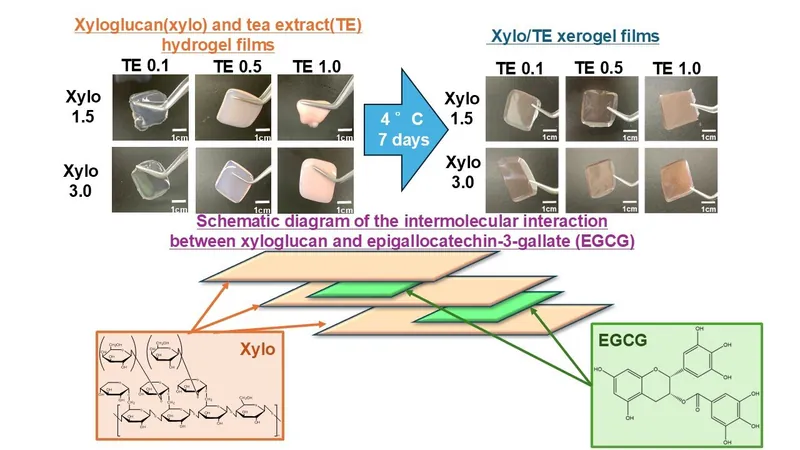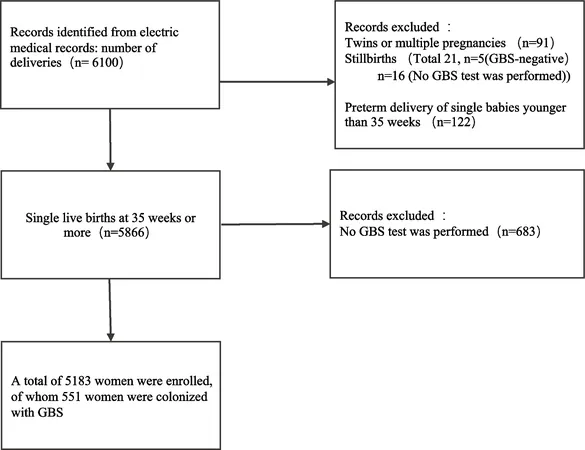
Revolutionary Green Tea Adhesive Films Could Change the Game for Oral Mucositis Treatment!
2025-01-22
Author: Li
Introduction
Green tea has emerged as a remarkable natural source of antioxidants, particularly due to its wealth of catechins, a type of polyphenol that plays a crucial role in combating oxidative stress. These antioxidants help neutralize the damaging free radicals produced during rigorous cancer therapies. With its noted anti-inflammatory properties, green tea offers hope in alleviating oral mucositis—an agonizing inflammation of the oral mucosa commonly triggered by chemotherapy and radiation treatments.
Research Overview
A pioneering study conducted by researchers at the Tokyo University of Science (TUS), Japan, explores the incorporation of these beneficial tea catechins in developing innovative adhesive films aimed at providing relief from oral mucositis, thereby enhancing patient comfort. This groundbreaking research has been documented in the journal *ACS Omega*.
Research Team and Goals
Under the leadership of Professor Takehisa Hanawa and in collaboration with other esteemed colleagues, including Dr. Yayoi Kawano of Nagoya City University and specialists from MP Gokyo Food & Chemical Co., Ltd., the TUS research team is dedicated to advancing solutions that align with the UN Sustainable Development Goals (SDGs), specifically targeting good health and well-being (SDG 3) and fostering innovation in industry (SDG 9).
Objective of the Study
Our objective was to create an easy-to-use formulation for oral mucositis that can significantly improve patients’ quality of life and reduce eating challenges arising from cancer treatments,” states Professor Hanawa.
Impact of Oral Mucositis
Oral mucositis is a distressing side effect affecting 30-40% of cancer treatment patients, resulting from damage inflicted upon the rapidly dividing cells of the mouth's mucosal lining. This painful condition can severely disrupt essential daily activities like eating and sleeping.
Innovation in Treatment
To combat this affliction, the researchers designed a flexible, mucoadhesive film enriched with tea catechins, allowing direct application to sore areas for sustained relief. This new innovation stands out as a convenient, cost-effective, and user-friendly alternative to conventional mucoadhesive tablets, which can often be difficult to use effectively.
Film Composition and Properties
These films are crafted by merging xyloglucan (Xylo), a water-soluble polymer derived from tamarind seeds, with a potent green tea extract (TE) containing over 75% catechins, including more than 40% of the highly regarded epigallocatechin gallate (EGCG). Xylo acts as a natural gelling agent, mimicking the mucin network found in the mouth, thereby ensuring the films adhere effectively.
Types of Films Developed
The researchers fabricated two distinct types of films: hydrogels, created by drying Xylo/TE solutions at low temperatures for 24 hours, and xerogels, which underwent a longer drying period of seven days for firmer results. While the hydrogels exhibited a tendency to weaken at body temperatures, the xerogel films displayed superior mucoadhesive strength—resisting detachment significantly better than available commercial products.
Testing and Results
In a key experiment simulating oral conditions using mucin disks coated with artificial saliva, detachment forces were measured. The xerogel films adhered securely, demonstrating adhesive strength that matched or exceeded that of conventional mucoadhesive films.
Release of Active Ingredients
Additionally, tests on the release of EGCG revealed that higher concentrations of Xylo resulted in a greater release rate over time—enabling a sustained release of active ingredients critical for patient care.
Future Directions
As Professor Hanawa notes, the Xylo/TE xerogel films exhibit robust strength, rapid water absorption akin to hydrogels, and powerful adhesion comparable to other commercial options. The team’s future efforts will focus on refining the film’s design and conducting safety and efficacy evaluations through cell-based experiments.
Conclusion
With these promising developments, the innovative green tea adhesive films signify a potential breakthrough in the management of oral mucositis, opening doors for improved patient experiences in cancer care. Stay tuned for what could be a revolutionary shift in how we tackle this painful condition!





 Brasil (PT)
Brasil (PT)
 Canada (EN)
Canada (EN)
 Chile (ES)
Chile (ES)
 Česko (CS)
Česko (CS)
 대한민국 (KO)
대한민국 (KO)
 España (ES)
España (ES)
 France (FR)
France (FR)
 Hong Kong (EN)
Hong Kong (EN)
 Italia (IT)
Italia (IT)
 日本 (JA)
日本 (JA)
 Magyarország (HU)
Magyarország (HU)
 Norge (NO)
Norge (NO)
 Polska (PL)
Polska (PL)
 Schweiz (DE)
Schweiz (DE)
 Singapore (EN)
Singapore (EN)
 Sverige (SV)
Sverige (SV)
 Suomi (FI)
Suomi (FI)
 Türkiye (TR)
Türkiye (TR)